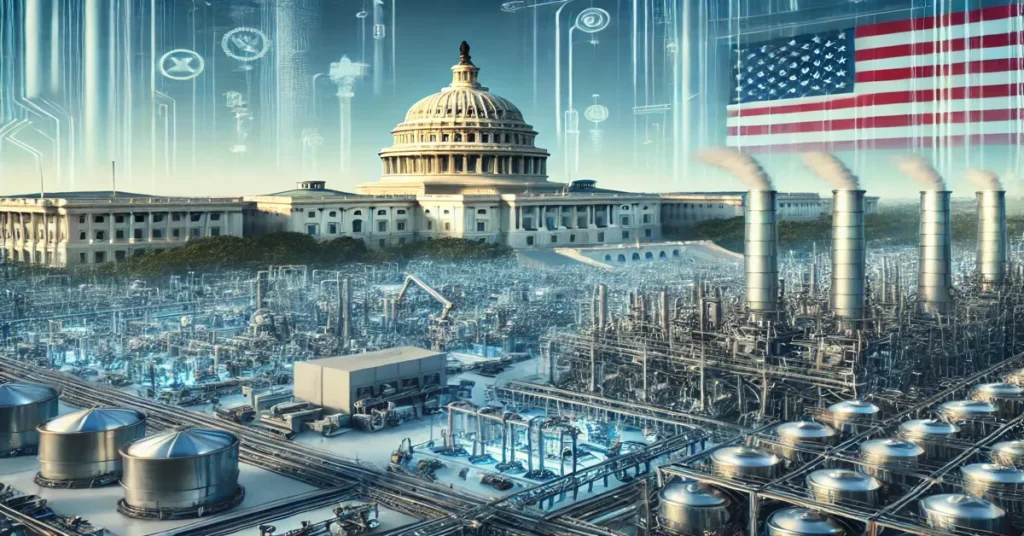In today’s globalized economy, companies that manufacture and supply essential products are often at the forefront of significant geopolitical and economic discussions. One such company is Fuyao Glass Industry Group Co., Ltd (Fuyao Glass Homeland Security)., commonly known as Fuyao Glass. Based in China, Fuyao Glass is one of the largest automotive glass manufacturers in the world, supplying a wide range of glass products to automakers and consumers globally. However, as the company continues to grow its presence in the United States and other international markets, it has inevitably intersected with issues of national security, trade policies, and economic integrity—particularly in the realm of homeland security.
This article explores the relationship between Fuyao Glass and homeland security, focusing on how the company’s operations, supply chains, and international footprint intersect with concerns related to national security in the United States. We will also delve into how companies like Fuyao contribute to economic stability, job creation, and security while simultaneously navigating complex regulatory environments. In the end, the article will provide insight into the broader implications for both Fuyao and homeland security in the context of the global automotive industry.
Understanding Fuyao Glass: A Global Powerhouse
Founded in 1987 by Chinese entrepreneur Cao Dewang, Fuyao Glass quickly rose to prominence as one of the world’s largest and most successful manufacturers of automotive glass. Its range of products includes windshields, rear windows, side windows, and sunroofs, among other specialized glass applications. Fuyao Glass supplies products to nearly every major car manufacturer, including General Motors, Ford, Volkswagen, Toyota, and Honda. The company’s global footprint includes manufacturing facilities in China, the United States, Russia, Germany, and more.
Fuyao’s Expansion into the United States
One of the most significant moves in Fuyao’s history was its decision to expand operations into the United States. In 2014, Fuyao purchased a defunct General Motors plant in Moraine, Ohio, and transformed it into a state-of-the-art glass manufacturing facility. This move was a part of the company’s broader strategy to globalize its operations and cater to American automakers from within the U.S. market.
The Moraine facility quickly became the largest auto glass production plant in the world, creating thousands of jobs for local workers and revitalizing the economy of the region. However, as Fuyao expanded its operations in the United States, it also found itself in the crosshairs of national discussions about economic security, trade relations with China, and the role of foreign-owned businesses in American industries. This is where Fuyao’s connection to homeland security comes into focus.
The Role of Homeland Security in Global Trade
Homeland security is a term typically associated with protecting a nation from external and internal threats, including terrorism, cyber-attacks, and natural disasters. However, in the modern era, homeland security has expanded its focus to include the protection of critical infrastructure, the economy, and supply chains that underpin national security.
Global companies like Fuyao Glass, which operate within strategic industries such as automotive manufacturing, play an integral role in the economic security of the countries in which they operate. For the U.S. government, ensuring that foreign companies comply with regulatory standards, do not threaten economic sovereignty, and safeguard intellectual property rights has become a priority. This is particularly relevant in the case of Fuyao, as the automotive sector is considered a critical part of the U.S. economy and infrastructure.
Economic Security and Job Creation
One of the key ways in which Fuyao contributes to homeland security is through its positive impact on the U.S. economy. By investing heavily in its Ohio plant, Fuyao has not only created thousands of direct jobs but has also stimulated the local economy by fostering a network of suppliers, contractors, and service providers. Economic security is a central pillar of homeland security, as a strong and stable economy makes a nation less vulnerable to external shocks and disruptions.
However, as a foreign-owned company, Fuyao’s presence in the U.S. also raises questions about the long-term implications of relying on non-American businesses for critical goods. The U.S. government, through agencies like the Department of Homeland Security (DHS) and the Committee on Foreign Investment in the United States (CFIUS), often scrutinizes foreign investments in sensitive industries to ensure that they do not compromise national security interests.
In the case of Fuyao, these concerns are mitigated by the company’s efforts to adhere to U.S. labor laws, environmental regulations, and trade agreements. Furthermore, Fuyao has made significant strides in integrating itself into the American economic fabric, presenting itself as a reliable partner for U.S. automakers.
Navigating Trade Tensions: China, the U.S., and Fuyao Glass
Trade relations between the United States and China have been a hot-button issue for years, particularly under the administration of former U.S. President Donald Trump, who imposed tariffs on a wide range of Chinese goods. The U.S.-China trade war created a volatile environment for companies like Fuyao, which rely on a globally integrated supply chain.
As a Chinese company operating on American soil, Fuyao found itself caught in the middle of this trade dispute. While the tariffs primarily targeted Chinese imports, Fuyao’s Ohio plant allowed it to continue supplying American automakers without being subject to those specific tariffs. Nevertheless, the broader political and economic tensions between the two superpowers underscored the challenges that Fuyao faced as it navigated both markets.
From a homeland security perspective, these trade tensions raised questions about the risks of economic dependence on China, particularly in industries critical to national infrastructure. The U.S. government’s concern is that reliance on Chinese companies for essential goods, such as automotive parts, could make the U.S. vulnerable in the event of a geopolitical crisis. Fuyao, however, remains a unique case due to its heavy investment in American manufacturing, which has allowed it to mitigate some of these concerns.
The Importance of Supply Chain Security
Supply chain security is another critical issue that ties Fuyao Glass to homeland security. In today’s interconnected global economy, disruptions to supply chains can have far-reaching consequences. This became especially apparent during the COVID-19 pandemic, when global supply chains were severely disrupted, leading to shortages of essential goods, including automotive parts.
The automotive industry, in particular, is highly dependent on complex supply chains that span multiple countries and continents. Fuyao’s global supply chain, which includes raw materials and manufacturing components from both China and the United States, is an example of how interconnected the modern automotive industry has become. For homeland security officials, ensuring that these supply chains are resilient and secure is paramount to protecting the U.S. economy from external shocks.
To this end, Fuyao has worked to diversify its supply chain and reduce its vulnerability to disruptions. By establishing a strong manufacturing base in the United States, Fuyao can continue to supply American automakers even in the event of trade disruptions or other global crises. This aligns with U.S. homeland security goals, as a secure and stable supply chain is essential for national security.
Intellectual Property and Cybersecurity
Another area of concern for homeland security when it comes to foreign-owned businesses is intellectual property (IP) protection and cybersecurity. In recent years, there has been growing concern about the theft of intellectual property, particularly in industries like automotive manufacturing, where innovation and technological advancements are critical.
Fuyao, as a global leader in automotive glass technology, invests heavily in research and development. The company holds numerous patents for innovations in glass production, including advancements in safety glass, energy efficiency, and design. Protecting these innovations is vital not only for Fuyao’s competitiveness but also for the broader automotive industry.
For homeland security officials, ensuring that foreign companies operating in the United States adhere to U.S. intellectual property laws is essential. Fuyao has taken steps to ensure compliance with these regulations, and there have been no major incidents involving IP theft related to the company. However, as the automotive industry continues to evolve with the rise of electric and autonomous vehicles, the importance of safeguarding technological innovations will only increase.
In addition to IP protection, cybersecurity has become a significant concern for companies like Fuyao. With the rise of digital manufacturing processes and connected supply chains, the threat of cyber-attacks has become more pronounced. Fuyao, like other major manufacturers, must invest in robust cybersecurity measures to protect its operations from potential threats.
Environmental and Regulatory Compliance
Environmental regulations and sustainability are increasingly important considerations for both homeland security and global companies like Fuyao. The automotive industry, in particular, is facing growing pressure to reduce its environmental impact, and glass manufacturing is no exception.
Fuyao has made strides in improving the environmental sustainability of its operations, both in China and the United States. The company has invested in energy-efficient technologies, waste reduction initiatives, and sustainable sourcing practices to minimize its environmental footprint. In Ohio, the Moraine facility has been recognized for its efforts to comply with U.S. environmental regulations and reduce emissions.
From a homeland security perspective, ensuring that companies operating within the United States comply with environmental regulations is critical. Non-compliance can lead to environmental degradation, which poses risks to both public health and national security. Fuyao’s commitment to sustainability aligns with the broader goals of protecting the environment and ensuring long-term economic stability.
Fuyao Glass: A Case Study in Global Integration and National Security
Fuyao Glass represents a case study in how global companies can successfully integrate into the U.S. economy while navigating the complex regulatory landscape of homeland security. The company’s investment in the United States has brought significant economic benefits, including job creation, technological innovation, and the revitalization of manufacturing infrastructure.
At the same time, Fuyao’s operations intersect with key homeland security concerns, including economic security, supply chain resilience, intellectual property protection, and regulatory compliance. As the world becomes increasingly interconnected, the role of companies like Fuyao in national security will continue to evolve.
For Fuyao, maintaining a strong relationship with U.S. regulatory bodies and adhering to homeland security guidelines is essential for its continued success in the American market. As the automotive industry transitions towards more advanced technologies, including electric and autonomous vehicles, Fuyao’s ability to innovate and secure its supply chains will be critical to its long-term viability.
Conclusion
Fuyao Glass stands at the intersection of global trade, national security, and economic prosperity. As one of the largest automotive glass manufacturers in the world, the company’s operations have significant implications for homeland security, particularly in the United States. Fuyao’s investment in American manufacturing, compliance with regulatory standards, and commitment to sustainability demonstrate that foreign-owned companies can play a positive role in both economic security and technological innovation.
As the global geopolitical landscape continues to shift, companies like Fuyao will need to navigate an increasingly complex environment. However, by maintaining a focus on innovation, compliance, and security, Fuyao is well-positioned to continue its growth while contributing to the economic and security goals of the nations in which it operates.
FAQs
- What is Fuyao Glass? Fuyao Glass is one of the largest manufacturers of automotive glass in the world, supplying windshields, rear windows, and other glass products to major automakers globally.
- How is Fuyao Glass connected to homeland security? Fuyao’s operations in the United States, particularly its large plant in Ohio, intersect with homeland security through economic security, supply chain resilience, and regulatory compliance.
- Why is the U.S. government concerned about foreign companies like Fuyao? The U.S. government monitors foreign-owned companies to ensure they comply with U.S. laws and do not pose risks to national security, particularly in critical industries like automotive manufacturing.
- How does Fuyao contribute to the U.S. economy? Fuyao has created thousands of jobs in the U.S. through its Ohio manufacturing plant and contributes to local economies through its supply chain and business operations.
- What are the cybersecurity concerns related to Fuyao Glass? Like all major manufacturers, Fuyao faces cybersecurity risks. The company must invest in robust measures to protect its operations and intellectual property from cyber threats.
- How does Fuyao address environmental concerns in its operations? Fuyao has implemented energy-efficient technologies, waste reduction initiatives, and sustainable sourcing practices to minimize its environmental impact in both China and the United States.







